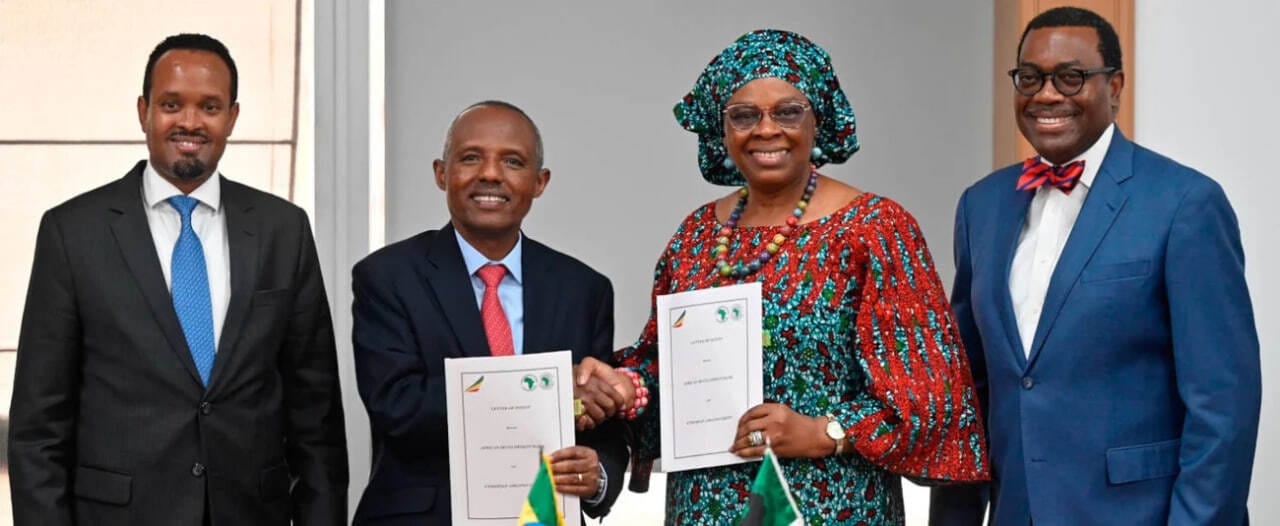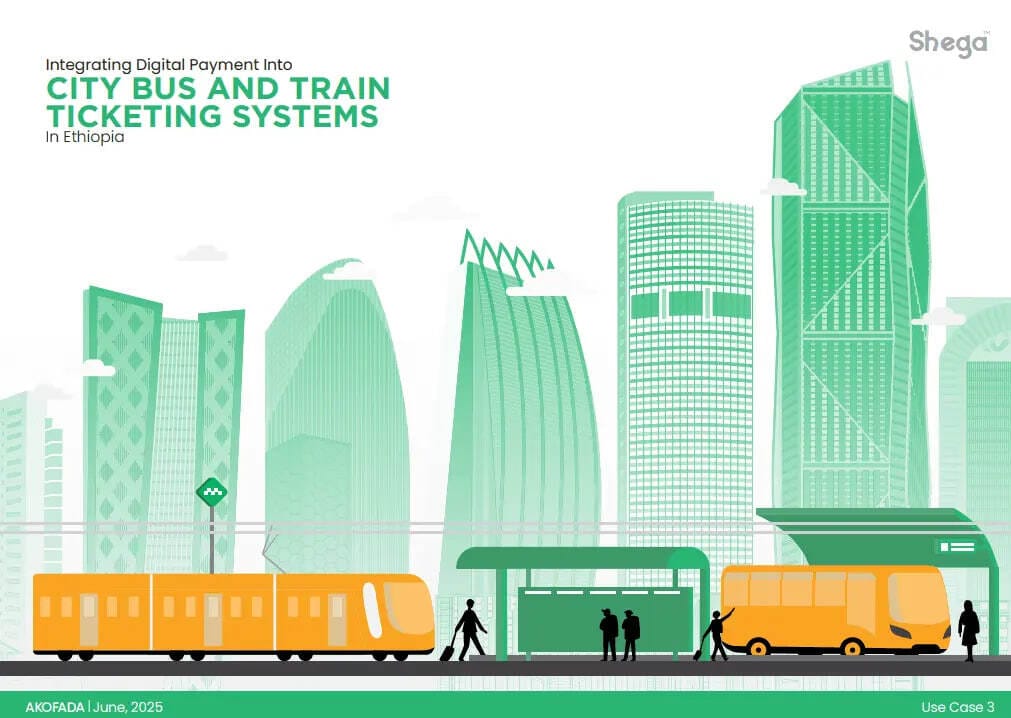
Top Stories of the Week
African Development Bank to Lead Efforts to Raise $7.8 Billion for New Ethiopian Airport
CBE Pulls Plug on Logo Redesign Amid Federal Backlash
Ethiopia Freezes New Power Permits for Crypto Miners Amid Capacity Saturation
Ethiopia’s Supreme Court First Cassation Bench Says Building on It Doesn’t Transfer Land Ownership Rights
Health Ministry to Introduce Guidelines for Passive Euthanasia

For the past 5 years, Shega has worked to provide clear, contextual coverage of Ethiopia’s innovation economy. As the market has evolved, so have the needs of the people shaping it. Decision-makers need more context, better data, and tools built for the complexity of Ethiopia’s market.
That’s why we’ve evolved. We’re entering a new chapter focused on delivering exactly that. Behind the scenes, we’ve been building something that goes further: a new way to help investors, founders, financial decision makers, program designers, market analysts, and policy advisors navigate what’s next. Be the first to experience what’s coming next.
African Development Bank to Lead Efforts to Raise $7.8 Billion for New Ethiopian Airport
The African Development Bank will take the lead in helping to raise $7.8 billion for a new airport in Ethiopia, the bank said.
When completed in 2029, the airport will be the continent's largest and will have the capacity to handle 100 million passengers a year.
"The appointment of the African Development Bank as lead arranger reflects its catalytic role in advancing strategic infrastructure across the continent and its proven leadership in structuring complex transactions," the bank said in a statement late on Thursday. Read more.
Zebegna Bets on Homegrown Tech to Solve Ethiopia’s Fleet Inefficiencies
IoTeq Solution has unveiled Zebegna, a locally designed transport-management platform that blends custom-built hardware with cloud-based software to tackle inefficiencies in Ethiopia’s logistics sector. Read more.
CBE Pulls Plug on Logo Redesign Amid Federal Backlash

A massive rebranding campaign at the state-owned Commercial Bank of Ethiopia (CBE) has been forced to halt in its tracks following blowback from senior federal officials who are dissatisfied with the design of a proposed new logo.
The industry giant’s branding rework and logo redesign has reportedly consumed upwards of half a billion Birr and was scheduled for rollout last week before CBE executives were ordered to cut short their plan by the federal government, according to the sources. Read more.
Somali Region Advances Budget Independence as Revenues Rise
Somali Regional State is moving closer to fiscal independence, with nearly half its budget now funded locally. Officials point to rising agricultural output and stronger tax enforcement as key drivers behind growing revenues. The region plans to cover 32.5 billion Br from its own resources in the upcoming fiscal year. Read more.
Ethiopia Freezes New Power Permits for Crypto Miners Amid Capacity Saturation

Amid growing concerns about local access, Ethiopian Electric Power (EEP) has announced it will no longer grant new power supply permits to data mining firms which including crypto miners.
While 25 companies already operate in the country, many drawn by abundant hydropower and low tariffs, EEP’s leadership says the national grid is under pressure to meet local demand first.
On one hand, crypto mining offers much-needed foreign currency (contributing to EEP’s 141% revenue increase this year). On the other hand, Ethiopia still has one of the lowest electrification rates in the region, with only ~50% of households connected to the grid. Read more.
Ministry Mandates Full Electronic Clearance for Top Taxpayers
Taxpayers under the Ministry of Revenues’ Medium No. 1 branch will have to ditch paper filings and switch entirely to the e-Clearance system for non-audited services starting August 1, 2025. The mandate, routed through the Ministry’s e-filing portal, is pitched as part of a broader push to modernize tax administration and advance the government’s digital agenda. Read more.
Learn from this investor’s $100m mistake
In 2010, a Grammy-winning artist passed on investing $200K in an emerging real estate disruptor. That stake could be worth $100+ million today.
One year later, another real estate disruptor, Zillow, went public. This time, everyday investors had regrets, missing pre-IPO gains.
Now, a new real estate innovator, Pacaso – founded by a former Zillow exec – is disrupting a $1.3T market. And unlike the others, you can invest in Pacaso as a private company.
Pacaso’s co-ownership model has generated $1B+ in luxury home sales and service fees, earned $110M+ in gross profits to date, and received backing from the same VCs behind Uber, Venmo, and eBay. They even reserved the Nasdaq ticker PCSO.
Paid advertisement for Pacaso’s Regulation A offering. Read the offering circular at invest.pacaso.com. Reserving a ticker symbol is not a guarantee that the company will go public. Listing on the NASDAQ is subject to approvals.
What’s on Our Mind
Ethiopia’s Year of the Floating Birr: Gains on Paper, Pain on the Ground
Last week marked a year since Ethiopia floated its currency under the banner of the International Monetary Fund–backed Home-Grown Economic Reform Program. On the first morning of the float, the Birr slid 30% against the dollar. By year’s end, it had lost 85% of its value.
The move was meant to treat a macroeconomy hobbled by dwindling foreign reserves, an expanding budget deficit, and chronically weak exports. In some respects, the prescription worked at a startling speed. Banks now reportedly disburse up to half a billion dollars a month. Exports are at record highs. Inflation is easing.
But beneath this polished narrative repeated with confidence by government officials, flows a darker reality: deepening poverty and a climate of institutional unpredictability.
The reforms have arrived not only with market liberalization but also with a slew of regressive taxes, the removal of energy subsidies, and across-the-board hikes in public service fees. Household disposable incomes have been pared to the bone. Gross tax collection has grown, but often by squeezing small businesses and low-income earners, driving more of the economy into the shadows. Presumptive taxation has become the rule rather than the exception, enforced in district offices where quota pressure encourages palm greasing and selective enforcement.
The promise of private sector–led growth has given way to something more familiar: state-owned enterprises tightening their grip. Shielded from real competition and largely immune to public scrutiny, they have raised prices in the name of “commercial viability,” deepening the strain on ordinary consumers.
One year on, the IMF, once a distant acronym in global economic chatter, has taken on an almost spectral presence in Ethiopia, looming in the popular imagination as a force of ill intent. The reforms may have delivered nominal success, but their real value, for many Ethiopians, feels like a loss.
Opinion: The Changing FMCG Landscape in Addis Ababa
Addis Ababa is undergoing a profound transformation, but as modern corridors rise, informal markets fall.
Souks that once drove 65% of FMCG volume are vanishing, and with them, livelihoods, communities, and cultural continuity. Meanwhile, businesses cling to outdated sales models, bleeding cash and missing the market's shift. Read more.
Ethiopia’s Supreme Court First Cassation Bench Says Building on It Doesn’t Transfer Land Ownership Rights
The Federal Supreme Court First Cassation Bench, sitting with seven judges, has issued a binding precedent clarifying that constructing a building on another person’s land does not confer ownership of the land.
The decision overturns earlier, conflicting judgments and establishes a uniform interpretation of property rights related to construction on land held by others.
The case arose from an inheritance dispute in which lower courts had ruled that structures built by some of the parties should be excluded from the inheritance property. Those courts based their decisions on provisions of the Civil Code. The Federal High Court upheld the ruling. Read more.
Ethiopian Trio Build Multilingual AI Assistant to Bridge the Language Gap

Three young Ethiopians have built Ras, an AI assistant trained on local data to serve speakers of Amharic, Afan Oromo, and Tigrinya.
In Ethiopia, where most people don't speak English fluently, language remains a major barrier to large language models like ChatGPT.
Ras can generate children’s storybooks through its mini app and soon can guide businesses through the stages of formation and licensing. Read more.
Health Ministry to Introduce Guidelines for Passive Euthanasia
Officials at the Ministry of Health have followed up the introduction of a proclamation permitting euthanasia with a draft directive outlining guidelines for passive euthanasia, or the withdrawal of life support.
The draft defines euthanasia as “the deliberate intervention undertaken with the express intention of ending a life to relieve intractable suffering” and permits its use for patients who are totally dependent on external support to maintain cardiac and respiratory function or patients diagnosed as brain dead. Read more.
Ethiopia Freezes Bank Accounts of 138 Suspects Over Illegal Foreign Currency Activities
The Financial Intelligence Service (FIS) announced that the bank accounts of 138 individuals suspected of engaging in “illegal foreign currency crimes” have been frozen as part of a crackdown on parallel market transactions.
According to a statement issued to state media, the suspects were identified through “ongoing surveillance efforts” and are accused of operating “outside the country’s formal financial system, bypassing legal banking channels”. The Service said the action aims to address persistent violations despite repeated government warnings. However, it provided no details of the 138 alleged suspects. Read more.
Ethiopia’s Green Transport Crusade Spawns Market for Fuel-Saving Technology Company

IoTeq Solution has unveiled Zebegna, a locally designed transport-management platform that blends custom-built hardware with cloud-based software to tackle inefficiencies in Ethiopia’s logistics sector.
Serving over 75 organizations, the platform combats fuel theft, unauthorized trips, and inefficient dispatch through real-time data and automated reporting.
Its upcoming release promises AI tools, visual dash-cam analysis, and tighter integration with national traffic and customs systems. Read more.
Integrating Digital Payment into City Bus and Train Ticketing Systems in Ethiopia

From long queues to unpredictable wait times, Ethiopia’s urban commuters face daily challenges. The sector needs an innovative solution that can significantly reduce the issues caused by a cash-heavy transaction system.
Explore the latest report under AKOFADA (Advancing Knowledge on Financial Accessibility and DFS Adoption), our initiative dedicated to bolstering access to information on DFS in Ethiopia. The report details how integrating digital payments into city buses and trains can make public transport more efficient, transparent, and inclusive.
Visit DFS Ethiopia Hub to download the report.
Heads Up: What’s Coming & What to Catch
From Our Bookmarks

